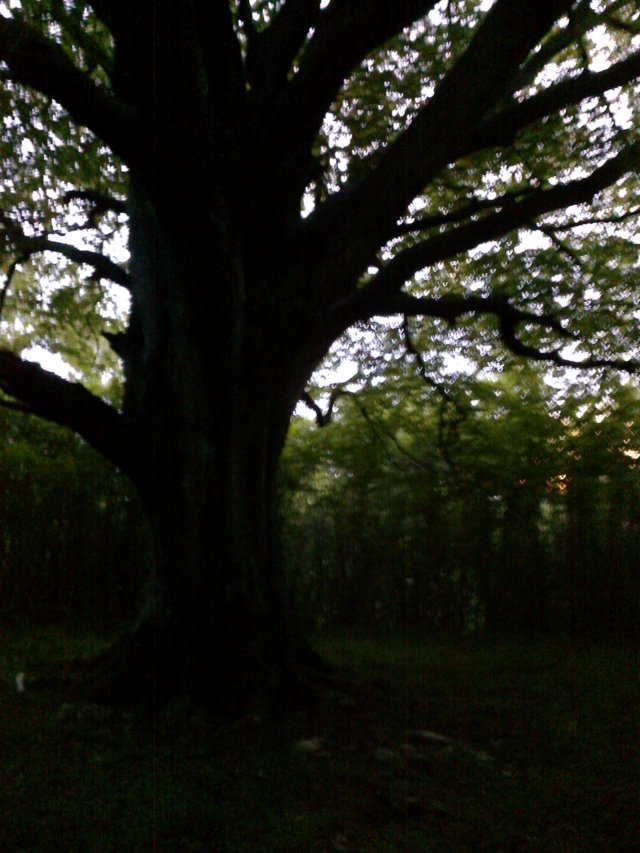A wildcamp
The trees all around are of narrow girth, like fenceposts; two hands fit around, but much taller: a beech canopy, half hiding the sky. I find an ancient beech, one of far greater circumference – so large I can lean my bike against the far side and it is hidden from the road. I sit for what feels like hours. I jumped over a fence to get here, aware that a wayward gamekeeper may not appreciate my prescence. The sun’s long set, but still I wait. I’ve not been aware of anyone passing behind, save for one car, and the eerie swoosh of two cyclists.
The middle of the night: I can hear church bells. Not the monotone note marking the passing of another hour; this is a peel. I am deep in a woods but can’t help but look around. I see nothing in the gloom, and certainly not the source of the chimes. But still they ring, on the very edge of my perception. Mischevious campanologists? Midsummer ritual? What else? I drift back to sleep.
I am sitting on a root bole, waiting to feel safe enough to bed down. I look up at the beech’s domed canopy. Dusk was long ago, but there is still some blue to the sky. The black branch-and-leaf silhouette gives the impression of immense constellations where the white-seeming sky breaks through the gaps. Still star-clusters occasionally drift when a light breeze passes.
I drink Glenlivet and think of little. At one point I try and read A Year in the Woods from the light of my phone, my lowest-powered source of luminescence.
Rolling and play-fighting, the three [badger cubs] head straight for me, flattening the young bracken. In a flash the leading cub takes a quick glance back to his pursuers, leaping to the very log I am sitting on, only inches away from me; he realizes something is different and stops in a sitting position like a well-trained dog. Cub number two glances back, chattering in glee at the game, still unaware the leader has stopped – and then crashes into his motionless playmate. Club one is almost driven into me with the impact; the third and smallest cub attempts to stop but it, too, slides into the others. By now the first two cubs are practically on my lap. As cub three collides he is so close I can hear the noise of his lungs empty out as I am hit in the face by bad badger breath.
After three short paragraphs I close the book, mindful that even this tiny light could attract attention.
It’s light; early evening. I sit on the wall with the fence and ancient beech behind; the road, then denser woodland in front. Frantic shrieks of an owl and two explanations come to mind: 1- the owl is being attacked and is struggling and fighting against its agressor, or 2- this owl can’t sing; still hasn’t found that B♭ it’s looking for. The crying gets more orderly, and fades to nothing.
I have laid my bivi and sleeping bags out in front of me. I get in as quietly as I can (that is to say, rather noisily). I lie still, make no sound. I hear a noise, a twig break, and my eyes dart to the left. Nothing. Slower rummaging ahead. Still nothing. I look left again. I see the four legs of a young deer: poised, unmoving. Five minutes later and still no movement. It is four closely-clustered fence posts, all leaning slightly.
I look forward. The sky has darkened, but can still be seen beyond the canopy. Now no longer constellations; it appears like a magic eye image. At first it seems as a vast blackboard with snow painted atop. But then my gestalt reflexes shift: the outline of an anthropomorphised deer stood on its hind legs. Some features of its head, a black void, then its snout: extending and contracting, whether from wind or my mind I cannot tell. But that, that’s definitely a deer, and it’s studying me.
I am in my bivi bag, trying not to move. It is almost completely dark. Somewhere very close a fox barks over and over. I figure it has realised something is not right in the woods. Has it sensed me? By sight? Smell? Sound? Does it bark to me, at me, or against me? I am physically uncomfortable, fixed in this position, and decide to move properly into my bivi bag (currently below my shoulders). The barking becomes less frequent, slips away. Silence.
I have been sleeping. I wake, and it is beginning to get light. I squint to my left, to the deer legs. In the clearing I see a girl of 8 or ten years, staring at me. She has long golden hair, and sits astride a white pony. Behind stands a white horse, that seems to be led by the young girl. They all stare motionless, without expression. I close my eyes and turn on my side, and fall back asleep. I feel myself become pinned to the spot. Someone, something is holding me there. It feels like a soft nuzzle, but not moving. I lay still, not scared, but wary. I hear nothing. No movement, no breeze, no breath. The snout still holds me. With a start I sit up. I see nothing in the dawn’s half-life. I ask myself what just happened but do not question things too much. I have outstayed my welcome; these woods no longer wanting me here. I pack my gear and ride away before the stirrings of the human day.
